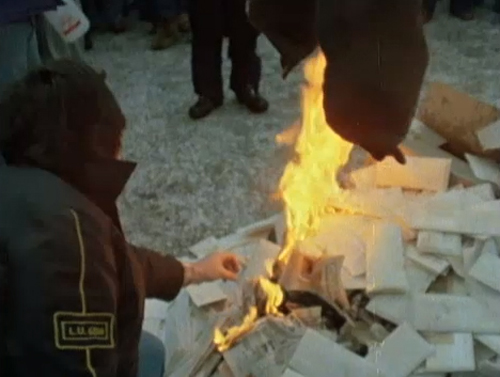Destroy Yourselves as Our Bosses
Victoria Brooks is a curator and producer based in Troy, NY. Prior to joining EMPAC (Experimental Media & Performing Arts Centre) in 2013 as curator of time-based visual art, Brooks was a London-based independent curator, co-founding the itinerant curatorial platform The Island, co-curating Serpentine Galleryʼs artist-cinema program, and producing Canary Wharf Screen for Art on the Underground. Together with Evan Calder Williams, she is currently organizing Third Run, a new yearly film journal and colloquium series to be launched in fall 2014.
Evan Calder Williams is a writer, theorist, and artist. He has a doctoral degree from the Literature Department at University of California Santa Cruz, where he wrote a dissertation entitled The Fog of Class War: Cinema, Circulation, and Refusal in Italy's Creeping’70s. He is the 2013-2014 Fellow at the Center for Transformative Media at Parsons, where is developing a theory of sabotage. He is the author of two books, Combined and Uneven Apocalypse and Roman Letters, has written for Film Quarterly, Mute, La Furia Umana, Viewpoint, and The New Inquiry, and writes the blog Socialism and/or Barbarism.
The connected talks of Evan Calder Williams and Victoria Brooks develop a feminist history of, and approach to, militant cinema from 1973 to 1983. In particular, they focus on critiques, both filmed and written, of how even allegedly radical movements reproduced a hierarchy of “legitimate” concerns that consistently framed the issues and modes of struggle posed by women as secondary to the cause at hand. This sidelining and its proprietary relation to politics has a history inextricable from labor movements themselves, but it becomes particularly visible with how practices of cinema directly engaged in social struggles negotiate what is literally foregrounded, drawn forth, or edited out. The first talk focuses on the Italian situation in the mid-’70s, considering "free newsreel" projects and experimental documentaries and reading their recurrent focus on the factory and piazza through the fierce critique articulated by Italian communist feminism in those same years. The second talk deals with films focused on women's relation to factory and mining struggles in Ontario. These films, including those by Sophie Bissonnette, Joyce Wieland, and Sandra Lahire, developed a complex vision of histories and voices continually pushed to the side of movements fighting for access to basic necessities of survival.
